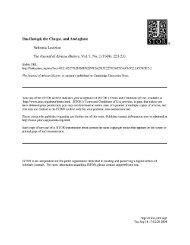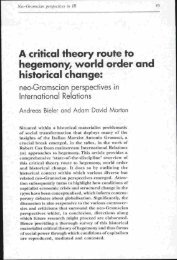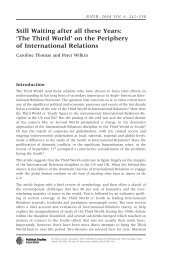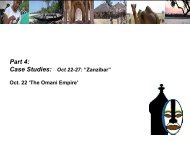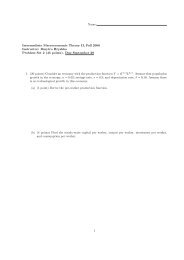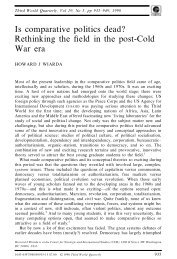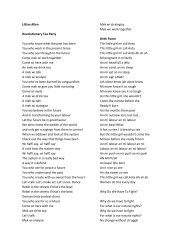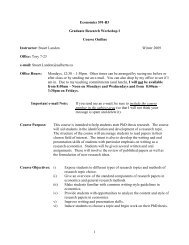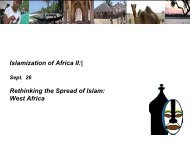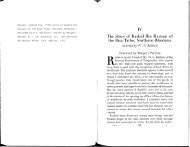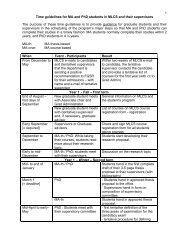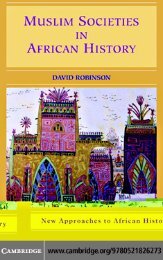personal memories revolutionary states and indian ocean migrations
personal memories revolutionary states and indian ocean migrations
personal memories revolutionary states and indian ocean migrations
Create successful ePaper yourself
Turn your PDF publications into a flip-book with our unique Google optimized e-Paper software.
pan-Arab movements <strong>and</strong> its contribution to reform <strong>and</strong> renewal movements<br />
throughout the Arab world. 8<br />
DE-PAROCHIALIZING DISCIPLINES AND GEOGRAPHY 9<br />
Arab history is not confined to Arab ‘nation-<strong>states</strong>’ <strong>and</strong> is not a monopoly<br />
delineated by their past or present boundaries. Arab history is as elastic as Arab<br />
geography <strong>and</strong> its definition is as resilient as that of the ‘Arab world’, 10 marked not<br />
by boundaries <strong>and</strong> frontiers but by a borderless identity, that al-Rayyis located in<br />
end-of-twentieth century Zanzibar. That identity builds its foundations on a<br />
common language <strong>and</strong> religion <strong>and</strong> draws on shared <strong>memories</strong> <strong>and</strong> cherished pasts<br />
that contract <strong>and</strong> exp<strong>and</strong> geography in order to accommodate history. 11 While it<br />
borrows from reality <strong>and</strong> imagination, memory <strong>and</strong> desire, it continues to wrap<br />
itself in the robe of the Arabic language <strong>and</strong> the garb of Islam. 12 It is this definition<br />
of Arab history that qualifies members of the Omani elite in Zanzibar --as speakers<br />
of Arabic, followers of Islam, <strong>and</strong> bearers of common history <strong>and</strong> beliefs with<br />
much of the Arab world-- to be identified as both subjects <strong>and</strong> agents of Arab<br />
history. So far, their role has not been recognized as such <strong>and</strong> they have been cast<br />
outside the field of Arab <strong>and</strong> Middle Eastern studies. 13<br />
This marginality of the Omani elite in Zanzibar is not confined to<br />
Arab/Middle Eastern studies alone but is also characteristic of Islamic studies. It is<br />
a Muslim elite but most of its members belong to a sect to which Islamicists have<br />
devoted little attention. Ibadism, one of the early sects of Islam, if not the earliest,<br />
<strong>and</strong> an offshoot of Kharijism, has generated limited interest among researchers.<br />
Although Ibadi communities are found almost exclusively in the Arab world, they<br />
rarely feature as contributors, or even participants, in modern Arab-Islamic<br />
history. 14 Thus, there is a ‘double marginalization’ occurring in the case of Ibadis –<br />
due to sectarian affiliation <strong>and</strong> to geographic location.<br />
This chapter in the history of Zanzibar, however, is as much part of<br />
African history as it is of the Arab one. These two fields are complementary <strong>and</strong><br />
overlapping though they are often treated as being dichotomous. 15 While the<br />
definition of ‘Arab’ tends to defy geography, that of an ‘African’ is often made to<br />
manipulate geography, insulating itself within borders, rigidly marked by the<br />
demarcations of a specific color, race, tribe, religion, or language. Arabs <strong>and</strong> Islam,<br />
along the lines of that definition, do not belong within those borders but outside<br />
them <strong>and</strong> do not usually fit the categories of ‘African’ races <strong>and</strong> religions. They tend<br />
to be often rejected as part of the African heritage. 16 It is for this reason that ‘Arab’<br />
North Africa <strong>and</strong> often the Sahara, are carved out of ‘African’ history with the<br />
assumption that they represent, <strong>and</strong> therefore, belong to another category of<br />
history. 17 As a result, several communities born out of this conjuncture of histories<br />
remain marginalized within the field of African history. This has been the case with<br />
the Omani ruling elite in Zanzibar. 18<br />
REDEFINING ‘ARAB’<br />
Arabs from the Arabian Peninsula have inhabited the East African coast<br />
for centuries <strong>and</strong> have contributed to the birth <strong>and</strong> development of Swahili<br />
language, culture <strong>and</strong> society. The arrival of al-Busa‘īdīs in the nineteenth century<br />
was but one more chapter in that continuous interaction between Arabia <strong>and</strong> East<br />
Africa, a by-product of their deeply interwoven histories. Omani Arabs, like many<br />
http://web.mit.edu/cis/www/mitejmes/<br />
45



